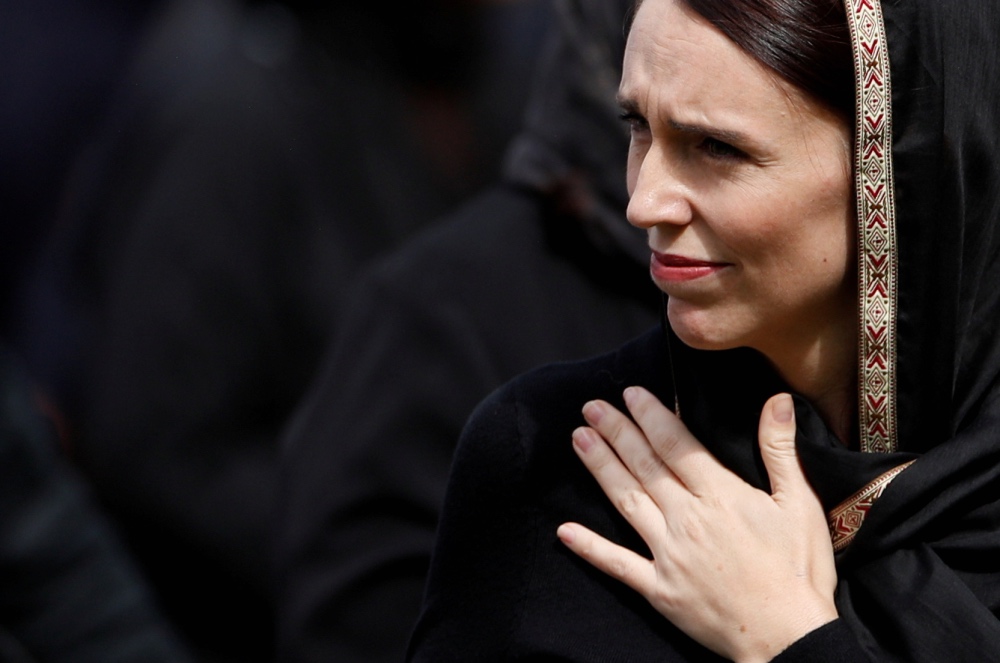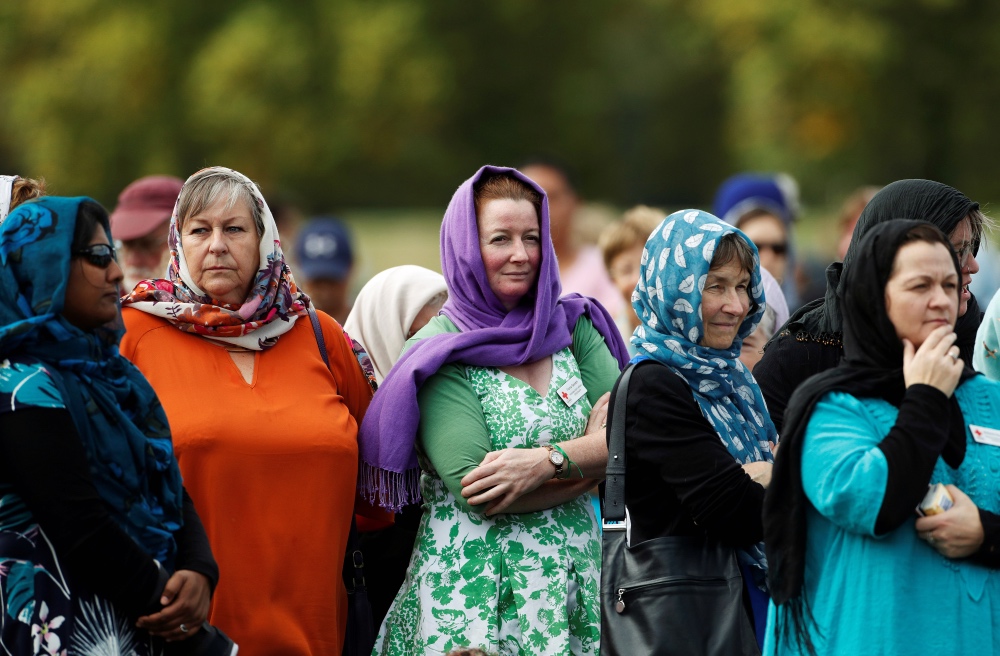
PRAVEEN MENON, of Reuters, reports from New Zealand ahead of the 15th March anniversary…
Wellington, New Zealand
Reuters
Days before the first anniversary of a shooting in Christchurch that killed 51 Muslim worshippers, a post appeared on an encrypted messaging app showing a balaclava-clad man outside one of the attacked mosques with a threat and a gun emoji.
The message was the latest in a number of threats against minorities in New Zealand, evidence of what experts say is an increase in hate crime and xenophobia since the mosque massacre by a suspected white supremacist on 15th March last year.

New Zealand’s Prime Minister Jacinda Ardern leaves after the Friday prayers at Hagley Park outside Al-Noor mosque in Christchurch, New Zealand, on 22nd March, 2019. PICTURE: Reuters/Jorge Silva
The gunman, armed with semi-automatic weapons, attacked Muslims attending Friday prayers in the South Island’s largest city, broadcasting New Zealand’s worst mass shooting live on Facebook.
Brenton Tarrant, an Australian national, faces 92 charges in relation to the attacks on Al Noor and Linwood mosques. He has pleaded not guilty and faces trial in June.
NEW ZEALAND MOSQUE ATTACK SURVIVOR SAYS SHOOTING HAS DAMAGED HIM FOR LIFE
A man shot three times by an armed attacker who stormed a mosque in New Zealand last year says the incident has left him physically and mentally damaged for life.
Sheikh Hasan Rubel, 35, was offering prayers at the Al Noor mosque in Christchurch on 15th March last year when the gunman burst in and started shooting.
The attack, streamed live of Facebook, killed 51 Muslim worshippers and injured dozens of others in New Zealand’s worst mass shooting.
Two bullets ripped through Rubel’s pelvis while another one went through his leg.
As New Zealand prepares to mark the one-year anniversary of the attack, Rubel says he is getting really anxious as the memories flood back.
“As 15th of March is approaching it’s a really shaky feeling for me,” he said in an interview with Reuters.
“That [attack] has damaged me physically a little bit but mostly it damaged my inside. Even nowadays when I remember that moment, how scared I was…how helpless I was,” he said.
Rubel, who is an accountant by profession, uses a walking stick now and needs more surgery to repair his pelvis. He is undergoing counselling for mental trauma and also physiotherapy treatment.
“I still remember the feeling when I was getting shot by one after one bullet…at one point I was thinking that at any time I can get shot anywhere and I’ll be dead,” Rubel said.
Throughout the attack, Rubel said he was thinking of his wife and young daughters.
Plans are underway for a prayer event in Christchurch on Friday and a national remembrance ceremony on Sunday, expected to be attended by Prime Minister Jacinda Ardern.
The events will be held under tight security following recent threats against Al Noor mosque.
The attack took away all his confidence and he lives in fear now, Rubel said.
“I get really afraid for small things. Nowadays I think any incident can happen anytime.”
Brenton Tarrant, a suspected white supremacist, is facing 92 charges related to the attack. He has pleaded not guilty and will face a trial in June.
Rubel, who moved to New Zealand from Bangladesh in 2015, says he has faith in New Zealand’s justice systems and hopes the culprit is punished. It would be hard, however, to ever forgive his attacker, he said.
“I’m not going to say that I forgive…it’s a big word to say,” he said.
– STEFICA NICOL BIKES/Reuters
New Zealand’s extraordinary outpouring of love and compassion for the Muslim community after the attack was led from the front by Prime Minister Jacinda Ardern. She swiftly introduced new gun laws and started a global movement to stamp out online hate in a response that was hailed as a model for other leaders.
But the attack also inspired far right nationalists and anti-immigration campaigners to be more active both online and offline, according to Muslim leaders, activists and experts.
“The attack certainly emboldened people who want to spread hate,” said Anjum Rahman from the Islamic Women’s Council of New Zealand.
The council has repeatedly alerted the government in the past year about the rise of the extreme right and the growing threat felt by Muslim women in New Zealand.
Rahman reported the latest threat against the Al Noor mosque to police after she was shown the image which was being shared on the encrypted social media messaging app Telegram.
Police said a 19-year-old man was charged with failing to assist police with a search warrant in relation to the incident and would appear in court later this month.
Local media reports have linked the man to a white nationalist group called Action Zealandia, which was formed in July, 2019, just months after the Christchurch attack. On its website it says it is focused on “building a community for European New Zealanders”.
In response to the incident, Action Zealandia said in a statement on Twitter the alleged actions of the accused are not within its code of conduct and was “immature and unproductive as we do not use violence to reach our goals”.
Police said they were working to ensure they have an in-depth knowledge of individuals and groups whose actions pose a threat but did not comment on any specific group.
More extremists
In a parliamentary committee meeting chaired by Ardern last month, New Zealand’s spy chief laid down the growing challenge since the attack.
“It [the attack] has given encouragement to some people, it has been inspirational to other people, and so it remains still quite a fluid picture,” NZ Security Intelligence Service Director-General Rebecca Kitteridge told the committee, according to transcripts of the meeting seen by Reuters.
“We have got more information about more people who are expressing extremist views than we had before 15 March, and some of those people existed beforehand, and then there is the impact of the attacks themselves afterwards,” she said.
Between 30 and 50 people are being actively investigated by the agency at any given moment for posing a terror threat, a higher number than in previous years.
Kitteridge said between 15th March and the end of June, 2019, the spy agency received leads about people who had expressed racist, Nazi, identitarian, or white supremacist views.
A survey by online safety agency Netsafe in December showed hate speech online increased in New Zealand in the last 12 months, with about 15 per cent of the adult population targeted with online hate.
Offline too, white supremacist posters have appeared in Auckland universities in the past few weeks leading up to the 15th March memorial.
There are about 60 to 70 groups and somewhere between 150 and 300 core right-wing activists in New Zealand, said Paul Spoonley, from Massey University, who has been researching far-right extremism for decades.

Women wearing headscarves as tribute to the victims of the mosque attacks are seen before Friday prayers at Hagley Park outside Al-Noor mosque in Christchurch, New Zealand, on 22nd March, 2019. PICTURE: Reuters/Jorge Silva
Proportionate to population the number was similar in size to far-right activists in Germany, he said.
“New Zealand is now part of an international far-right ecosystem in a way that you can’t have said 20 years ago,” Spoonley said.
“We do well on the league tables for tolerance, but that does not mean there are no extreme elements,” he said.
Hate speech
Ardern said she was “devastated” by the latest threats against Al Noor mosque and it indicated that more the work needed to be done.
“We have to get back to the basics of why is it that people would feel that they can make those kinds of threats against other people’s lives,” she told reporters.
A big part of the problem was that unlike the United States or Britain, New Zealand has never recorded specific hate crime offences, raising questions about what signs security agencies may have missed.
Police have now started recording instances of offences that appear to be motivated by hate, Justice Minister Andrew Little told Reuters.
The ministry is also reviewing the country’s hate speech laws, although these plans have been challenged by groups who say free speech would be curtailed by such laws.
“Further work is needed on where the line on free speech is drawn. But I anticipate a balanced approach will be taken when the review process is complete,” Little said.
A decision is expected within months.





